/ Full archive
The Festival of Learning in 2014: put 9th- 15th June in your diary and get engaging!
 The Festival of Learning in 2014: put 9th– 15th June in your diary and get engaging!
The Festival of Learning in 2014: put 9th– 15th June in your diary and get engaging!
I have been relatively quiet on the research blog on all things Festival of Learning over the past few months, but that doesn’t mean we’ve not been working on the Festival of Learning. In-fact quite the opposite – since the Festival doors closed back in June, we’ve taken time to reflect, evaluate and consider how the Festival should evolve in 2014. 
Looking back
Before I say anything further about our plans for next year, can I take the opportunity to say a huge thank you to everyone that was involved in the Festival in 2013. The public reaction has been absolutely fantastic. We had an estimated 4,000 visits to the Festival, an average satisfaction score (from 1,400 evaluation forms) of 5.9 out of 7 (where one equalled very poor, and 7 equalled excellent) and 96% of respondents suggested that they wanted to come to another event. Further to this, the Festival team continued evaluating the Festival through a series of focus groups and interviews which has generated excellent feedback and brilliant ideas of activities to include in 2014. We have also received great feedback from many local key stakeholders stating just how much the Festival is valued.
If you want to re-live the Festival for a few moments, then watch this fantastic video as a reminder of just some of the Festival highlights.
Looking forward – save the date: 9th-15th June, 2014
The Festival dates have now been set for 9-15th June. This year, we are keen to build on our successes and create much more of a Festival atmosphere! So do get these dates in your diary now and your thinking cap on about how you can make a contribution.
How to get involved
We have received lots of feedback on the types of activities that people really enjoyed in 2013, so as a result the Festival team will be inviting people to include events in 2014. However, we are also keen to ensure that everyone within BU that has a brilliant idea has the opportunity to put this forward to the Festival steering group.
If you already have an idea in mind as to what you would like to include as part of the Festival in 2014, please contact me directly by emailing redwards@bournemouth.ac.uk or by completing the FoL 2014 event proposal form and returning it to Rebecca Edwards.
Although June my seem like a long way away as the nights draw in and the temperatures falls, because of the sheer size of the Festival, we need have details of all proposed events by Friday 6th December.
If you don’t have any ideas, but are really keen to get involved in the Festival, do give me a call on 01202 961206 or email me on redwards@bournemouth.ac.uk.


Latest Major Funding Opportunities
 The following opportunities have been announced. Please follow the links for more information:
The following opportunities have been announced. Please follow the links for more information:
- The AHRC has a call for Expressions of Interest to present virtual exhibitions of images on their website. Maximum funding: £4,000. Closing date: 29/11/13
- The AHRC Creative Economy Showcase 2014 requires Expressions of Interest. Award maximum not specificed> Closing date 27/11/13
- AHRC has announced the Cultural Value Project Targeted Call for Critical Reviews and Research Development Awards and Expressions of Interest to deliver Expert workshops. Maximum grant £100,000 and £10,000 respectively. Closing date 7/11/13
- Biotechnology and Biological Sciences Research Council (BBSRC) / Royal Society of Edinburgh Enterprise Fellowships aim to increase exploitation of ideas with commercial potential from BBSRC supported research. Maximum award not specified. Closing date: 28/11/13
- The BBSRC is offering FAPESP Pump-Priming Awards (FAPPA). Maximum grant £35,000. No closing date but applications must be made at least 12 weeks before the proposed start of the project
- Supporting international collaboration, BBSRC-Brazil (FAPESP) are joint funding research. Maximum grant not specified. Closing date: 8/01/14
- Similarly the BBSRC’s Other Countries Partnering Awards supports long-term collaborations. Maximum grant not specified. Closing date: 27/11/13
- The BBSRC call for Resolving Technological and Methodological Gaps in Metagenomics is open. Maximum award not specified. Closing date: 8/01/14
- British Academy is offering postdoctoral fellowships to foreign researchers. Maximum award not specified. Closing date: 5/12/13
- The EPSRC is inviting applications for access to ARCHER through its resource allocation panel. Top-up applications are also accepted. Maximum award not specified. Closing date: 18/12/13
- EPSRC, as part of the RCUK Energy Programme, invites proposals for collaborative research projects to undertake fundamental research to tackle challenges in carbon capture for carbon capture and storage (CCS). Maximum award not specified. Closing date: 29/11/13
- Healthcare Technology Cooperatives partnership awards are beign supported by the EPSRC/NIHR. Maximum award £150,000. Closing date: 7/01/14
- ESRC is launching the second round of the ESRC Transformative Research Call. Maximum grant £200,000. Closing date: 15/01/14
- The ESRC Europe – China call for collaborative research on The Green Economy and Understanding Population Change has opened. Maximum grant not specified. Closing date: 3/12/13
- The ESRC Celebrating Impact Prize is an annual opportunity to recognise and reward the successes of ESRC-funded researchers. Maximum ward £20,000. Closing date: 22/11/13
- ERA-NET Plus on Climate Smart Agriculture – under the ERA-NET Plus action “Climate Smart Agriculture: Adaptation of agricultural systems in Europe” co-funded by the Seventh Framework Programme (FP7) of the European Commission, there is a call for pre-proposals relating to the adaptation of European agriculture to climate change in its broad sense. Maximum grant not specified. Closing date: 2/12/13
- The Leverhulme Trust is supporting Major Research Fellowships in the Humanities and Social Sciences. Maximum award not specified. Closing date: 8/05/14
- The Leverhulme-Royal Society Africa Award for scientists who want to develop a collaborative research project between the UK and research institutions in either Ghana or Tanzania has been announced. Maximum award £210,000. Closing date: 15/01/14
- The MRC has opened the Health systems research initiative call 1: Providing evidence to strengthen health systems and improve health outcomes. Grant maximum not specified. Closing date: 14/01/14
- NERC have announced their ESPA Fellowships. Maximum award £200,000. Closing date: 20/11/13
- The Royal Academy of Engineering has announced The Leverhulme Trust Senior Research Fellowships Scheme. Maximum award not specificed. Closing date: 18/11/13
- Royal Society Wolfson Research Merit Award provides universities with additional support to enable them to recruit or retain respected scientists of outstanding achievement and potential to the UK. Maximum grant not specified. Closing date: 12/11/13
- Royal Society Leverhulme Trust Senior Research Fellowship reimburses the employing institution with the full salary cost of a teaching replacement. The scheme covers all areas of the life and physical sciences, including engineering, but excluding clinical medicine. Award not specified. Closing date 8/01/14
- The Agri-Tech Catalyst, run by the Technology Strategy Board and the Biotechnology and Biological Sciences Research Council, offers funding to innovative businesses and researchers to develop solutions to global agricultural challenges. see detials on the Early Stage and Late Stage awards. Grant not specified. Registration by 4/12/13 and submit by 11/12/13
- Also via the TSB’s Agri-Tech Catalyst, there are Industrial research awards. Maximum grant £3,000,000. Registration by 4/12/13. Submission by 11/12/13
- The TSB has announced their Innovative Research Call – IRC 2013 – Detection of explosives and weapons. Maximum grant £950,000. Registration by 27/11/13. Submission by 4/12/13
- The TSB and Medical Research Council programme is offering funding to innovative small and medium sized businesses (SMEs) and researchers to develop solutions to healthcare challenges via their Biomedical Catalyst – Feasibility studies call. Maximum funding £200,000. Registration by 5/02/14. Submission by 12/02/14
- Also through the TSB’s Biomedical Catalyst, funding is available via the Early and late stage awards. Maximum award not specified. Register by 5/2/14 and submit by 12/2/14
- The TSB is making an investment of up to £2.5m in collaborative R&D projects that lead to the creation of ‘frictionless’ digital transactional environments. Register by 13/11/13 and submit by 20/11/13
- The Toshiba Fellowship Programme is a unique opportunity for recently qualified PhD level scientists, mainly from science, computing and mathematics disciplines. Maximum award not specified. Closing date: 6/12/13
- The Wellcome Trust is offering Senior Investigator Awards in Medical Humanities, New Investigator Awards in Medical Humanities, Senior Investigator Awards in Society and Ethics, New Investigator Awards in Society and Ethics. Maximum award £1,000,000. Closing date: 21/03/14
- Pathfinder Awards are being offered by The Wellcome Trust. These provide pilot funding for Academic-Industry partnerships to develop early-stage applied research and development projects in orphan and neglected disease areas. Maximum grant £100,000. Closing date: 9/01/14
- The Wellcome Trust’s Translational Medicine and Therapeutics Programmes – this flagship scheme has established four high-quality integrated research training programmes for clinicians in translational medicine and therapeutics. Maximum award not specified. No closing date.
- Arts Awards, from The Wellcome Trust, support imaginative and experimental arts projects that explore biomedical science. Awards are available for large and small projects, above and below £30,000. Closing date 24/01/14
Please note that some funders specify a time for submission as well as a date. Please confirm this with your RKE Support Officer.
You can set up your own personalised alerts on ResearchProfessional. If you need help setting these up, just ask your School’s RKE Officer in RKE Operations or see the recent post on this topic
Global Agenda in Social Work
The Centre for Social Work, Sociology and Social Policy cordially invites you to an afternoon seminar
‘The Global Agenda for Social Work: is it relevant to social work practice in England?’
Speaker: Dr David N Jones, Former President of the International Federation of Social Work (IFSW) and IFSW President’s Special Representative for the Global Agenda. Currently holding a post for PeopleNeedPeople. UK
Wednesday 23rd October
13.00-14.00
Executive Business Centre EB202
Biography:
Dr Jones has been at the centre of international social work developments for many years and is an acknowledged expert on the new trends and agendas that are shaping global social work. Known throughout the world for his passion for promoting civil society, we are very privileged to be able to host Dr Jones’ seminar at the Centre and would strongly encourage all members of staff and students with an interest in international social development and social work issues to attend what will be a most interesting and rewarding public seminar whatever your background (more…)
Who are BUCRU? Introducing members of the team and our expertise

In last week’s post we gave you a brief introduction to BUCRU and how we can help you. This week we introduce you to the members of the team.

Front row (L-R): Lisa Gale, Louise Ward, Helen Allen, Sarah Thomas, Zoe Sheppard. Back row: Peter Thomas, Annabel Kenny-Jones, Paul Thompson, Audrey Dixon.
Professor Paul Thompson
Paul is Consultant Rheumatologist at Poole Hospital and Visiting Professor at BU. He was appointed Director of the Centre of Postgraduate Medical Research and Education (CoPMRE) in 2007, where he has been leading developments between research and education active doctors in NHS Trusts and the academic community at the University. He is Co-Director of BUCRU, Lead for the musculoskeletal local priority group for the Western Comprehensive Local Research Network (CLRN) and Fellow of the NHS Improvement Faculty. He is interested in clinical research and service development in the rheumatic diseases. He supervises PhD students and is an External Examiner at other Universities.
Professor Peter Thomas
Peter is Co-Director and leads on research methodology. He has a background in epidemiology and statistics, and has been with Bournemouth University since 1996. He has a special research interest in psychosocial aspects of chronic disease and much of his recent work has focused on multiple sclerosis.
Dr Sarah Thomas
Sarah is Deputy Director (methodology). She has a background in psychology and since 2000 has worked in the NHS in Dorset. As well as supporting other researchers in a Research Design Service capacity, she also conducts research. Her main research interests are in the field of multiple sclerosis (MS) and she is currently Chief Investigator for a pilot study funded by the UK MS Society exploring the use of the Nintendo Wii™ in people with MS.
Helen Allen
Helen is a health psychologist with a nursing and midwifery background. She has a qualitative background with a particular interest in the mind:body interface and chronic disease, including patient empowerment. She is the Unit lead on Public Patient Involvement.
Professor Roger Baker
Roger is Professor of Clinical Psychology and runs the MSc course Foundations in Clinical Psychology at BU. He is also a Consultant Clinical Psychologist at Dorset Healthcare University NHS Foundation Trust. He has expertise in the design of assessments and questionnaires, research design and clinical evaluation of services and has worked in a dual role as researcher and clinical psychologist at Leeds, Aberdeen & Bournemouth Universities and in NHS Trusts specialising in Mental Health.
Audrey Dixon
Audrey is the Centre of Postgraduate Medical Research and Education (CoPMRE) co-ordinator and co-administrator for BUCRU. She has worked for the NHS since 1988. She first joined Professor Paul Thompson in 2001 to assist him with his academic work, following his secondment to the University. Audrey was seconded to BU in 2003. She now looks after a growing Visiting Faculty and the education arm of CoPMRE. She is very proud to see the little acorn grow into a Centre of Postgraduate Medical Research and Education and BUCRU.
Louise Fazakarley
Louise is a Physiotherapy lecturer with experience in neurological rehabilitation, the management of chronic disability and rehabilitation research. She joined Bournemouth University in 2006 to establish and teach on the BSc (Hons) Physiotherapy course. Louise is currently working on the MS Society funded pilot study to look at the Nintendo Wii™ as a method of helping people with MS increase their physical activity.
Lisa Gale
Lisa joined the team in May 2013 as Clinical Research Co-ordinator. She has a background in psychology and previously worked in the research department of a local NHS Trust. The main focus of Lisa’s role is to create a seamless link between academics at BU and clinicians in the NHS who are interested in interprofessional, high quality research to construct bids for funding, develop project plans, and conduct research.
Annabel Kenny-Jones
Annabel is a Clinical Research Administrator who joined Bournemouth University in October 2009. She provides support to Professor Tamas Hickish, Consultant Medical Oncologist, Royal Bournemouth Hospital/Poole Hospital and the rest of the research team on various ongoing research projects within the Unit.
Dr Zoe Sheppard
Zoe is a demographer with particular experience investigating socio-economic status. She joined Bournemouth University in October 2009 as a Research Fellow in Research Methods. She provides research methods support for people doing health research and support writing grant applications in her National Institute for Health Research (NIHR) Research Design Service (RDS) capacity.
Louise Ward
Louise is one of the administrators for the unit and has been with the team since 2008. She has worked in various NHS settings and has an interest in marketing. Both her undergraduate and Master’s degrees were studied here at Bournemouth University.
Contact us:
You can contact us by:
- email: BUCRU@bournemouth.ac.uk
- Tel: 01202 961939
- Twitter: @BU_CRU
- Website: http://blogs.bournemouth.ac.uk/bucru/
Or pop and see us on the 5th floor of Royal London House!
Likely path to communication value
The Public Relations Research Group welcomed the leading Canadian practitioner, Fraser Likely, on Wednesday when he presented a lecture on communicating the value of PR departments to top management. It was attended by regional practitioners, students, academics, and Marketing & Communication staff.
Mr Likely, who is an adviser to Canadian banks, corporations and governmental bodies, emphasised the need for senior communication staff to understand their organisation fully, identify the elements of their department’s work that create value and operate in an entrepreneurial manner.
“This presentation was the first of several events in which academic research and practice issues are discussed with practitioners, students and fellow academics”, said Prof Tom Watson of The Media School. “On Wednesday, our speaker was an internationally highly-regarded practitioner and researcher. In others, BU academics will take recent research to practitioners at events in London and locally.”
The Public Relations Research Group is planning short seminars with the Chartered Institute of Public Relations in London and Wessex, as well as with Ketchum, a leading international PR consultancy group.
Simultaneously, the US-based Institute for Public Relations posted Fraser Likely and Tom Watson’s latest Research Conversations blog post on future trends in PR measurement and evaluation. It is based on a recent book chapter in a festschrift to the leading PR theorist, James E. Grunig: http://www.instituteforpr.org/2013/10/future-trends-in-measurement-and-evaluation/
Energy related funding in Horizon 2020 – webinars to tell you all!
 EU Energy Focus are hosting some free webinars to provide further info on energy related calls in Horizon 2020. As its only 8 weeks til the calls are released, these are a fantastic opportunity to learn more about what’s coming up: The webinar programme is as follows:
EU Energy Focus are hosting some free webinars to provide further info on energy related calls in Horizon 2020. As its only 8 weeks til the calls are released, these are a fantastic opportunity to learn more about what’s coming up: The webinar programme is as follows:
| 1. Energy in Horizon 2020 Introduction to Horizon 2020 and the Energy funding priorities www.eventsforce.net/h2020-1 | Wednesday 23rd October 1pm |
| 2. Energy Efficiency Buildings and Consumers, Heating and Cooling www.eventsforce.net/h2020-2 | Tuesday 5th November 12.30pm |
| 3. Energy Efficiency Heating and Cooling, Industry and Products www.eventsforce.net/h2020-3 | Friday 8th November 12.30pm |
| 4. Energy Efficiency Finance for Sustainable Energy www.eventsforce.net/h2020-4 | Tuesday 12th November 12.30pm |
| 5. Low Carbon Energy Research and demonstration for renewables plus market uptake, innovation and Coordination and Support Actions www.eventsforce.net/h2020-5 | Thursday 14th November 12.30pm |
| 6. Low Carbon Energy Research and demonstration for grids, storage, biofuels, CCS plus market uptake, innovation and Coordination and Support Actions www.eventsforce.net/h2020-6 | Wednesday 20th November 12.30pm |
| 7. Smart Cities and Communities www.eventsforce.net/h2020-7 | Friday 22nd November 12.30pm |
Narrative Research Group Seminar Series

In the first NRG talk for this academic year, Hywel Dix, Senior Lecturer in English and Communication, will present a paper on “Marking and Re-marking: Tracing the Tattoo in Crime and Detective Narratives”. The abstract for Hywel’s paper follows. All are welcome to come along to the talk on Wednesday 30 October at 2p.m in TAG01.
Implicit in its straddling of two different sets of social relationship, one bourgeois and the other at least potentially subversive, the portrayal of the tattoo in recent fiction points to a radical instability in the perceived status of tattooing as social practice, and implies a contemporary shift in the status of that practice in society. Drawing on Howard Becker’s classic sociological analysis of different art worlds, this paper will analyse the portrayal of tattooing as cultural practice in Sarah Hall’s The Electric Michelangelo and Alan Kent’s Voodoo Pilchard. It will explore how much the social practice of tattooing was a subversive one in the early twentieth century; and to what extent that practice has recently become incorporated into the mainstream of fashion and consumer society. It will ask to what extent tattoos could be considered legitimate serious art in the early twentieth century and today; and to what extent the recognition of tattooing as legitimate art comes at the cost of compromising the politically transgressive potential of the practice.
Kicking off! Sociology + International Placements
In May 2013 four students from HSC’s BA Sociology & Social Policy programme undertook a 25-day placement in Malaysia, hosted by the Faculty of Social Sciences at Universiti Sains Malaysia located on the beautiful, historical island of Penang under the conscientious supervision of HSC’s Visiting Professor, Dr Azlinda Azman, Chair of Social Work, USM. The aim of the placement was to enable students to apply a sociological analysis to the constructions of welfare and care-giving in a very different socio-cultural context.
The four students, Heidi Crew, Samineh Hall, Dannielle Connolly and Roxanne Boydell successfully applied for BU Global Horizon funding. This valuable financial assistance enabled the students to help to spearhead the first set of planned steps towards the internationalisation of the Sociology+ programmes in delivering a FUSION focus.
Placements were divided into those for elderly citizens or children and young people with disabilities. The students were able to choose from a placement that related to their Level I study options, and go on to experience a number of different settings. The following extracts from their detailed narratives offer a glimpse into how the students negotiated unfamiliar constructions of need and care in an unfamiliar, post-colonial cultural setting.
Elderly care residential Homes (Sami, Roxanne and Danni):
The donations that the Home receives are very impressive. Even though families are unable to look after their elders due to the change in family structures and work, the elderly still hold a very important place within the community. People of Penang speak very fondly of the Home.
All in all, we learnt a lot from our weeks at placement and were very grateful to have been able to witness first-hand how the elderly were looked after in a different culture. From this experience we have drawn that there are many similarities in the way the Homes are run in Malaysia.
Unlike in the UK, the most popular Homes are charities and run on public donations. They receive many of these as Asia still regards their elderly population very highly. However, with the growing elderly population, we were able to witness the impact of the gap between young and old and the change in the family structures. All the Homes were struggling to find enough volunteers to help look after their residents as most of the young generation now (in particular young women who usually had the role of carer) have careers and may opt to put their relatives in a Home rather than adopt the old traditions of caring for the elderly at home.
Working with children with disabilities (Heidi):
World Play Day was another of my most memorable days. This was based at my second placement in Balik Pulau, where I would be based for the last 3 weeks I was in Malaysia. It is literally in the middle of nowhere: no shops near by and a 2-hour bus journey from Penang.
World Play Day was run by the older residents (18 and above) with varying disabilities, physical and mental. All the children from First Steps and any other children with disabilities within the area or outside, such as the mainland were invited to join in. ‘We are special’ was their motto, and every helper was given a T-Shirt saying this.
I was personally in charge of the ‘starch pool’. This was where the children could get used to texture, and some of them loved it. It was a swimming pool of rice flour and water, so that it made a thick gloopy mixture and was dyed pink with food colouring to appeal to the younger children.
Maddie, one of the other helpers, was in charge of the water slide. This was a tarpaulin sheet covered in water and washing up liquid, whilst there were other activities going on too. Everyone had a different station that they manned. I was just as covered in the starch at the end as the children were. The key to success on days like this was to get involved.
The day was and is sponsored annually by Starbuck Coffee. I never used to put money in their charity boxes that said ‘to help Asian communities’. Now that I’ve seen exactly what that money does and the amount of smiles that are produced from it I will never walk away from that charity box without putting something in.
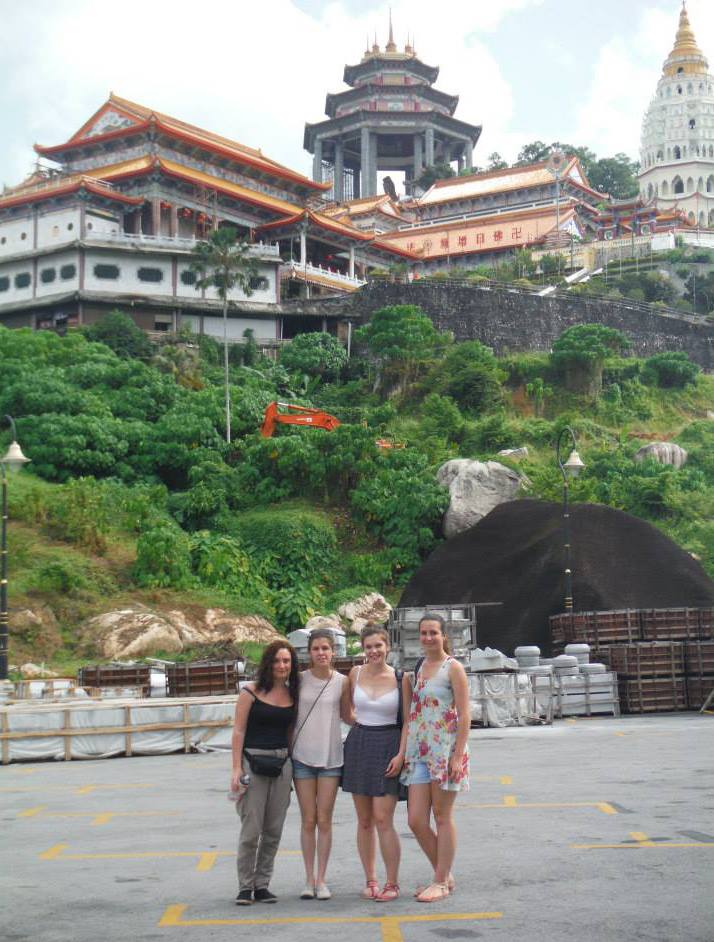
Poland and the Eurozone Conference, 19th & 20th September 2013 – what a success!
The Bournemouth University Business School hosted the conference “Poland and Eurozone” on 19-20 September, 2013. The conference was the initiative of Professor Jens Hӧlscher, head of the department of Accounting, Finance and Economics of Bournemouth University (BU). 
The conference was opened by Professor Matthew Bennett, Pro-Vice-Chancellor at BU, who greeted the participants of the conference, wished them success and scientific achievements. He expressed the hope that the conference would provide a platform to discuss and address the relevant issues and to initiate new joint research projects.
Following a short welcoming speech by Professor Jens Hӧlscher, Professor Iraj Hashi from Staffordshire University was invited to briefly introduce Professor Leszek Balcerowicz’s biography to the participants of the conference. Professor Iraj Hashi highlighted that Professor Leszek Balcerowicz was the former Deputy Prime Minister, Minister of Finance of Poland and the chairman of the National Bank of Poland, who is particularly famous for implementing the Polish economic transformation program in the 1990s, a shock therapy, which is commonly referred to as the Balcerowicz Plan.
In his keynote presentation Professor Leszek Balcerowicz focused on the issues relevant to the Euro problems and their possible solutions. Following the presentation Professor Victoria Chick from University College London initiated the discussion on the Professor Leszek Balcerowicz’s presentation and challenged his views.
The second day of the conference started with the keynote presentation of Professor Domenico Mario Nuti from La Sapie nza University (Rome) on The Euro Area: Premature, Diminished, Divergent, which was followed by the lead discussant Professor Steve Letza from BU.
Then the chair Professor Jenny Piesse from BU opened Session One on Income Developments. The session started with an interesting presentation by Professor Andy Mullineux from Bournemouth University on The ‘Eurozone’ Crisis: Escaping the Doom Loop.’ The session was continued by the presentation of Professor Horst Tomann from Free University of Berlin on External Imbalances in the European Monetary Union: the Case for Keynesian Income Policy and was finished by the presentation of Dr George Filis and Professor Steve Letza from BU on Business Cycles Synchronisation between the European Union and Poland.
Following the buffet lunch, where the participants of the conference discussed the presentations Professor Allan Webster (BU) opened Session Two on Monetary Aspects. Rob Hayward form the University of Brighton and Jens Hӧlscher started the session with their presentation on Crash Risk and the Carry Trade: An Analysis of Uncovered Interest Parity in CEE and CIS. The session was continued by the Professor Karsten Staehr from Tallin University of Technology & Estonia Eesti Bank on Beating the Maastricht Price Stability Criterion to Join the Eurozone: Challenges and Options. Following the presentation by Zbigniew Polanski from National Bank of Poland on Poland During the Global Crisis: “A Green Island” approaching the Eurozone the chair of the session Professor Allan Webster announced to start the discussions on the presentations of Session Two.
Following a short coffee and tea break Professor Steve Letza opened Session Three on Firms’ Behaviour. Malgorzata Pawlowska from National Bank of Poland presented her research on the Impact of Foreign Capital on Competition and Concentration in the Polish Banking Sector. The second presentation of the session was given by Professor Tomasz Mickiewicz from Aston University, where he introduced his research on Is Poland A Nation of Entrepreneurs?
A conference Gala Dinner at the Russell-Cotes Art Gallery and Museum, Bournemouth, was a pleasant completion of the conference. In an informal atmosphere participants continued to discuss various interesting issues raised during the conference, made contacts and thanked the organisers for the well-planned scientific event.
Written by,
Khurshid Djalilov, kdjalilov@bournemouth.ac.uk, member of EACES
Students Reflect on Internationalisation Experience
In September, four sport students engaged in intensive extra-curricula internationalisation activities in order to enhance their study, professional and personal intercultural experience. This BU blog article combines their personal reflections.
Sport management and sport development students Luke Frary, John Bryson, Oliver Johnson and Stefan Ferencz significantly contributed to the Student Seminar and the main conference of the European Association for Sport Management (EASM) in Turkey from 7 to 14 September (http://blogs.bournemouth.ac.uk/research/2013/09/19/bu-sport-students-and-academic-succeed-at-european-association-for-sport-management-conference-in-istanbul).
The students’ key reflections and conclusions in short:
- Oliver Johnson: “Upon first hearing about the opportunity to participate in the reputable European Association of Sports Management conference and Master Student Seminar in Istanbul, I was instantly attracted and impressed that my university was able to offer this to me. (…) Looking back, what I achieved over the course of the week has been astonishing, as I honestly believe that the experiences that I have gathered shall put me in a great stead for the future. I would recommend such an experience to anyone, it really is an opportunity not to be missed.”
- Luke Frary: “Over the next few days we got to know the various individuals from all over Europe as we engaged in the Masters Student Seminar. The topics covered where not entirely different to those I had covered at Bournemouth, but through adding an international perspective, the approach becomes refreshingly different. (…) Later in the week we were divided into groups to work on a management game. I was grouped with students from Germany, Finland and Holland. Once again it was insightful to work with the addition of an international dimension. It became clear that when studying in just one country, it is easy to adopt a narrow approach to your studies.”
- John Bryson: “I thoroughly enjoyed this international experience and the chance to stay in a foreign city and work collaboratively with people from such diverse backgrounds and cultures. This is an experience that I have gained many new skills form and will benefit me greatly going forward.”
- Stefan Ferencz: “The main conference enabled me to learn about current issues and trends in the field of sports management, thus providing me with useful information that I will utilise in my final year. Having observed how speakers structure their presentations, I now feel more confident about speaking at the presentations required for some of my units during level H. (…) I would recommend any sports management student to attend an EASM conference as it will definitely have a positive impact on skills, knowledge and future career. Overall, I feel proud to have successfully represented Bournemouth University at an international stage.”
Please read about their reflections in more length below the pictures.
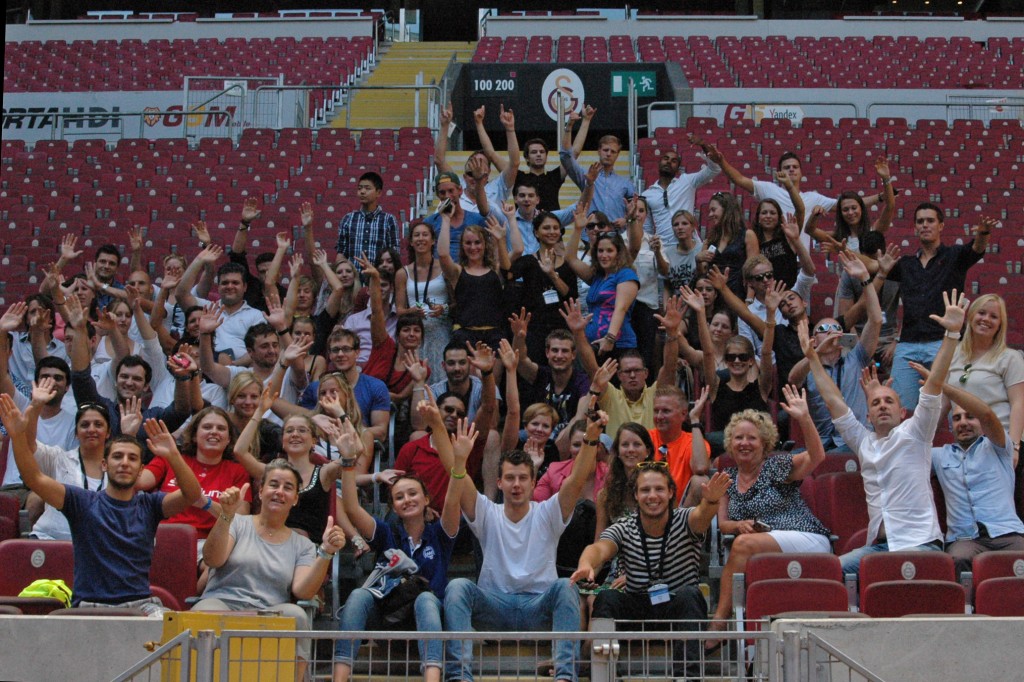
Part of the international student group during venue visit and on-site lecturing in Istanbul.
John Bryson (second from left) during team work.
Luke Frary in discussion with the NBA Europe Business Development Manager
International students mingling during coffee break. In the middle, BU students talking to retired UNICEF Partnership Director.
Stefan Ferencz (third from right) with his team, awarded for winning their case competition.
John Bryson
“I travelled to Istanbul along with three other Bournemouth University students to attend the European Association of Sports Management (EASM) Masters Student Seminar and EASM Conference. The seminar and conference provided me with some excellent experiences including presenting my dissertation research, working in a team with other international students in a sports management game, gaining an insight into cutting edge sports management research and issues and also making many professional and personal contacts.
With help and guidance from Dr Tim Breitbarth I was able to present my dissertation research at the corporate social responsibility workshop during the EASM Conference alongside many of the authors that I had referenced in my own work. This was a rewarding experience as I was able to make a contribution to the conference while showing off my dissertation that I had worked on throughout the previous academic year.
During the student seminar I also worked on a sports management game. I found this particularly interesting as it allowed me to work on a real life scenario to devise and implement solutions. During the management game I was required to work in a team with students from The Netherlands, Finland, Germany and Turkey. I really enjoyed the opportunity to work alongside other students from different countries and cultures and the challenge of combining many different ideas and perspectives into a successful end product. In the end our hard work paid off as we won our case competition and were able to work on the project further and present it our final solution at the main conference.
The seminar and conference also provided me with the opportunity to make many professional and personal contacts that will be very useful going forward in my career. The management game was especially useful for networking as we were devising solutions for industry professionals and it was a useful task to showcase your imagination, creativity and problem solving skills.
I thoroughly enjoyed this international experience and the chance to stay in a foreign city and work collaboratively with people from such diverse backgrounds and cultures. This is an experience that I have gained many new skills form and will benefit me greatly going forward.“
Luke Frary
“Upon leaving the arrivals lounge of Istanbul’s Ataturk Airport it was highly satisfying to be instantly reminded that we were visiting new territories when our non-English-speaking taxi driver some how managed to gesture that there would be a suspicious extra charge for our ‘over sized luggage.’
After a short ride we arrived with a warm welcome at the reception of our hotel (which clearly was going to exceed all expectations of accommodation at a student conference). Here we were informed that we would be separated and would be sharing rooms with students from other European Universities as a way of encouraging the ‘multicultural atmosphere’ that the conference programme alluded to. In hindsight, we were extremely naïve as we approached this with scepticism – one of the many valuable lessons we learnt during the conference.
After a short while we were escorted to the Sports campus of Mamara University for the opening of the Masters Student Seminar. Once again the scepticism set in when we heard the words ‘ice-breaker’ bellowed above the closed conversations taking place in small clusters of previously familiar friends. We then proceeded to play a number of games that finished with holding hands and dancing around in a circle to a Turkish song. Little did we know that this song would become a regular during the conference and a very memorable part of the trip.
Over the next few days we got to know the various individuals from all over Europe as we engaged in the Masters Student Seminar. The days started with Key Note speeches on some highly engaging topics. The topics covered where not entirely different to those I had covered at Bournemouth, but through adding an international perspective, the approach becomes refreshingly different.
Later in the week we were divided into groups to work on a management game. I was grouped with students from Germany, Finland and Holland. Once again it was insightful to work with the addition of an international dimension. It became clear that when studying in just one country, it is easy to adopt a narrow approach to your studies.
In between the keynote speakers and the management game, we were able to select from a number of sports activities. For me the highlight was kayaking along the Bosphorus and mooring alongside a Turkish restaurant to sample a local snack.
The following week welcomed the main conference. There were some very interesting presentations and there were many great opportunities to generate ideas and inspirations to take into one’s own studies. In the evenings the hospitality the Turkish had arranged was phenomenal. It was great to share these moments with the large group of new friends we had made.
The conference came to its finale with a cruise around the Bosphorus in a yacht big enough to accommodate the entirety of the conference delegate list. As the boat returned at the end of the evening and it was time to say goodbye to our new friends, it became clear how enriching the whole experience had been and how our expectations had been greatly exceeded in all areas.”
Stefan Ferencz
“The EASM 2013 conference in Istanbul has been a unique experience that has given me the opportunity to expand my knowledge in the field of sports management and also to create a network of sports management students from around Europe.
The adventure began with the Student Seminar held at one of the campuses of Marmara University. Presentations delivered by academics and professionals were soon followed by the Management Game. The Management Game focuses on a very engaging and challenging group activity which gave me the opportunity to work with students from different countries, to develop communication and decision making skills and to work effectively under time pressure. I feel that I have benefited from all the challenges that arose during group work, from the research required to deliver the presentation as well as from the reward of producing the best case study for the allocated subtheme.
The main conference enabled me to learn about current issues and trends in the field of sports management, thus providing me with useful information that I will utilise in my final year. Having observed how speakers structure their presentations, I now feel more confident about speaking at the presentations required for some of my units during level H. The conference has been an amazing source of information provided by well-known academics and professionals and has generated many ideas for my future dissertation. Along with great social and sporting activities organized by staff, the conference has ended in style, with a superb boat trip on the Bosporus.
I would recommend any sports management student to attend an EASM conference, as it will definitely have a positive impact on skills, knowledge and future career. Overall, I feel proud to have successfully represented Bournemouth University at an international stage and I would very much like to get involved in future EASM projects.”
Oliver Johnson
“Upon first hearing about the opportunity to participate in the reputable European Association of Sports Management conference and Master Student Seminar in Istanbul, I was instantly attracted and impressed that my university was able to offer this to me. I applied in order to further my working experience, looking to participate in activities outside my comfort zone and within a foreign environment. I believe this is crucial to any student’s development, as not only does such an activity like appealing on a CV to employers, it helps to develop key characteristics such as communication, team work and working under pressure within a foreign environment.
A factor that enabled me to participate in the conference was the backing of the Global Horizons Fund, as they seek to provide financial assistance to students, like myself, who are enthusiastic and eager to learn or participate in competitions abroad to further their education. Organisations such as Global Horizons make such an opportunity all the more attainable, as there are often financial restrictions associated with learning abroad which often dissuade students from participating.
My week in Istanbul was split into two halves: the first half, as part of the Master Student Seminar, was based at Marmara University and the other half, in the heart of Istanbul, at the Istanbul Convention and Exhibition centre for the main conference. The structure of the Master Student Seminar was organised excellently, as there was balanced daily routine of informative, interesting speakers and leisure activities.
The main focus of the seminar was the Master Student Seminar competition, where students were randomly assigned to multi-national working groups. The aim was to put together a presentation and report on an assigned topic. I was assigned to the topic of Corporate Social Responsibility, whereby our group had to propose an idea, on behalf of a local company, in order to promote physical activity amongst the community. Initially, I did find the task challenging, as the groups were comprised of foreign students, it was occasionally difficult to communicate effectively. However, I believe that our group gelled remarkably and were able to collate a strong argument for our case. This was proven as we were selected as the winners of our topic, where we would progress to present at the main conference in front of a jury of astute professionals and conference attendees, competing against other student groups’ topics. Personally, I have very little experience in presenting in front of a large audience; therefore I initially felt the prospect of doing so very daunting. Nevertheless, it was a fantastic experience to showcase our hard work at such an esteemed event. My group was eventually announced as winners of the overall competition, an achievement that I am extremely proud of.
Although the work involved was demanding, there was allocated time to see the sights of wonderful sights of Istanbul and to have fun. My personal highlight of the trip was kayaking up the river Bosporus and under the Fatih Sultan Mehmet Bridge, a spectacular sight. As mentioned previously, the organisation of the trip was excellent, with the assistance of several Marmara University students, who would often act as tour guides always willing to recommend places for us to visit and making sure everyone was looked after.
Looking back, what I achieved over the course of the week has been astonishing as I honestly believe that the experiences that I have gathered shall put me in a great stead for the future. I would recommend such an experience to anyone, it really is an opportunity not to be missed.”
Have you been involved with an event designed for the external community?
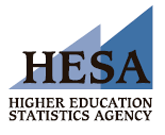 Then we want to hear from you! 🙂
Then we want to hear from you! 🙂
The University is currently compiling the data for the annual Higher Education – Business & Community Interaction survey (HE-BCI) due to be submitted to HESA in early December.
We are asked to submit details of social, cultural and community events designed for the external community (to include both free and chargeable events) which took place between 1 August 2012 and 31 July 2013.
Event types that should be returned include, but are not limited to:
- public lectures
- performance arts (dance, drama, music, etc)
- exhibitions
- museum education
- events for schools and community groups
- business breakfasts
We cannot return events such as open days, Student Union activity, commercial conferences, etc.
All events that we ran as part of the Festival of Learning in June 2013 are likely to be eligible for inclusion and we will collate this information on your behalf centrally.
If you have been involved with an event which could be returned (other than those run for the Festival of Learning), please could you let your contact (see below) know the event name and date, whether it was free or chargeable, the estimated number of attendees, and an estimate of how much academic time was spent preparing for (but not delivering) the event:
- ApSci – Eva Ashford
- BS – Julia Woodwock
- DEC – Norman Stock
- HSC – Andy Scott
- MS – Avril Harrison
- ST – Rob Hydon
- Professional Service – please contact Julie Northam in the R&KEO
The data returned is used by HEFCE to allocate the HEIF funding so it is important that we return as accurate a picture as possible.
Santander and BU Research mobility link continues.
As sponsors of Formula One, Santander were lucky enough to secure some time with the Formula One racing driver Jenson Button to meet some of the Formula Santander Scholars, along with Santander Chairman, Emilio Botin. Two research students from the Media School and one from HSC were able to travel for research purposes as recipients of the Santander Award and to a reception at the British Medical Association House on Tavistock Square, London on Wednesday 26th June for an address from the Chairman and some words from Jensen. The recipients received certificates and there was an opportunity for a Question and Answer session with Jensen.
http://www.santander.com/csgs/Satellite/CFWCSancomQP01/en_GB/Corporate/Press-Room/Santander-News/Emilio-Botin-y-Jenson-Button-entregan-100-Becas-Formula-Santander-a-universitarios-britanicos-Only-available-in-Spanish.html
Hai Chung said that “I came to know that the extensive Southeast Asia collection at Yale University is an impressive and influential resource for any researcher on South East Asia across the world. Thanks to Santander, I got a rare chance this year to visit Yale University where I was able to update myself on the latest research and discuss with professors there about my work. In relation to actual outputs, the trip gives me additional evidence and elaborates upon my analysis in my findings. I was impressed with the number of scholarships funded by the Santander this year and appreciated a chance to meet formula 1 driver Jenson Button yesterday in London. Thanks again Santander for their generosity in supporting and creating chances for researchers in UK.”
Marketa Zezulkova’s cross-cultural project explores how is children’s media literacy being formed during the first years of their compulsory education; in order to contribute to the international development and implementation of suitable media education for primary and elementary school children. Marketa was in the USA, collecting primary data and undertaking position of a Visiting Scholar at Emerson College (Boston, MA) and at Media Education Lab, the University of Rhode Island (Kingston, RI) as part of Santander?
Sheetal Sharma who this summer is again a Santander visiting PhD researcher at IsGlobal, Cresib – the Barcelona Centre for International Health Research (CRESIB) part of the Hospital Clínic de Barcelona, the University of Barcelona, and the August Pi i Sunyer Biomedical Research Institute (IDIBAPS); supported by the Generalitat de Catalunya. She is supervised in health economic evaluations by Dr. Elisa Sicuri aiming to use novel techniques in the evaluations of health programmes in Nepal: http://www.cresib.cat/en/page.asp?id=216
The suggestion from this event was to organize a BU Santander Scholars session with a representative from Santander Universities (UK) in the near future to try and give back in terms of lessons that can be learnt from research mobility.
Become an EC reviewer to gain experience, money and collaborators!
 The EU’s Education, Audiovisual and Culture Executive Agency is seeking external expertise in the Erasmus+ or Creative Europe (MEDIA, culture) programmes. Don’t worry, they don’t expect you to be an expert in the programme (which hasn’t been released yet) just the general subject areas of PhD student mobility, staff mobility, media, culture etc – the topics the funding calls cover.
The EU’s Education, Audiovisual and Culture Executive Agency is seeking external expertise in the Erasmus+ or Creative Europe (MEDIA, culture) programmes. Don’t worry, they don’t expect you to be an expert in the programme (which hasn’t been released yet) just the general subject areas of PhD student mobility, staff mobility, media, culture etc – the topics the funding calls cover.
Registering to be an expert has lots of value – you could get paid to evaluate and monitor projects or evaluate calls for proposals under the schemes. Indeed, becoming an EC evaluator is a fantastic experience; it not only helps you learn what the EC are looking for in proposals, but also enables you to travel to Brussels and network with other reviewers to start forming collaborations yourself.
It’s really simple to sign up, you just pop your details in the form (which isn’t very long) and when an appropriate call or proposal comes up, they will ask if you can review it. If you can’t, you simply let them know and you are not obliged to. You also get until December 2020 to sign up to be a reviewer if you aren’t quite ready yet!
You will get paid a day rate to do the review plus travel and subsistence and you can also still apply for the funding scheme if you are registered as a reviewer (although for a specific call you apply to, you would have to declare a conflict of interest).
More info can be found here
Unmanned Technology:key to success or limiting factor – moral and legal issues arising from the use of UAV drones in Afghanistan
Sascha-Dominik Bachmann, Associate Professor, Dep Law, EBC, addressed this year’s NATO JAPCC Joint Air & Space Power Conference 2013 – Air Power Post-Afghanistan.
JAPCC’s annual Conference provided a forum for critical discussion of themes arising from military Air Power and the ramifications of the anticipated 2014 cessation of NATO-led combat operations. The Conference was organized by the Joint Air Power Competence Centre and led by Air Marshal David Walker, RAF (http://www.japcc.de/fileadmin/user_upload/events/Conference/2013/2013-03-25-JAPCC_Conf_2013_Flyer_web.pdf).
Sascha reflected on the legal and moral issues arising from Targeted killing by drones (using Unmanned Aerial Vehicles (UAV) or Unmanned Combat Aircraft Systems (UCAS) as weapon platforms) which has become an increasingly debated subject. Criticism is not only directed against its overall legality and legitimacy, but also its negative impact on the theatre state as a sovereign state in cases of extraterritorial strikes, a potential lack of efficiency, and a growing uneasiness with its morality. It seems there has been a change in how targeted killing is viewed. Apart from a growing discomfort with civilian ‘collateral’ casualties, there is growing concern about its effectiveness and the acceptance of targeted killing as a new form of warfare. Ben Emmerson, the newly appointed UN Special Rapporteur on Human Rights and Counterterrorism, has called for more transparency and accountability when employing this form of warfare. – See more at: http://blog.oup.com/2013/06/drone-targeted-killings-pil/#sthash.Kky1JmWv.dpuf
Phenomenology Special Interest Group
Reflections from Utrecht…
…Heidegger by ice cream!
You are warmly invited to the fifth meeting of the Phenomenology Interest Group
Thursday 14th November 2013
1.00 – 2.30
Venue: EB303, Executive Business Centre
We are fortunate to host Vanessa Heaslip from HSC and Phil James from the School of Tourism who have freshly returned from a workshop in Holland. They will be sharing their thoughts and experiences. This will last about one hour including discussion and questions. You are also invited to stay on for a further half hour to participate in more general discussion of mutual interests and the planning of further directions.
Here is a more personal invitation from Vanessa:
Both Phil and I were lucky enough to have the opportunity to travel to the Netherlands during the summer to attend the Utrecht summer school on the Phenomenology of Practice.
During this lunchtime session we plan to:
present the main areas we studied in the programme
outline our perspectives on the differences between the approaches of Hermeneutic Phenomenology (Max van Manen), Descriptive Phenomenology (Andy Giorgi) and Interpretative Phenomenological Analysis (Jonathan Smith)
present our reflections on the two week programme
highlight the key lessons we learnt
share the opportunities it has provided for us (and maybe you…) at an international level
We look forward to seeing you.
Vanessa Heaslip (HSC – Senior Lecturer and part time PhD student)
Phil James – (PGR at ST and proud of the fact that he has both a Student ID and a Bus Pass! Phil is a retired businessman who thought that studying for a PhD might be more fun than cruising in the Bahamas. He’s having second thoughts.)
The Cambodian Experience
 Dr Melanie Klinkner shares her experience of undertaking research in Cambodia…
Dr Melanie Klinkner shares her experience of undertaking research in Cambodia…
Perhaps it is due to a genetic predisposition to embrace the continental Kaffeehaus tradition of discussing matters for hours on end or simply because of an affinity to the Socratic dialogue, interviewing has been a key component of my research. It would be wrong to say that I am not nervous before each interview or don’t question my methodological approach, but, in general, interviews have been exciting, worthwhile and a superb way to network. I keep being amazed by the generosity of participants in giving up their time, going to the trouble of meeting me, sharing their experience and expertise, sending relevant information or answering follow-up questions.
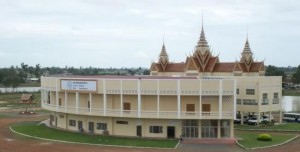 The experiences from a fieldtrip to Cambodia epitomises the fun of qualitative research for me. On arrival at the Extraordinary Chambers in the Courts of Cambodia outside the capital Phnom Penh, I was met by the then head of PR who had not only organised an interview schedule with judges, prosecutors and defence lawyers but also offered me a tour of the (then not quite complete) building. Sure, this might have been part of their general public relations efforts, but it was me who benefitted from meeting these individuals. I was the lucky one sitting in the office of a Cambodian participant, with a translator present, conducting an interview whilst feeling strangely observed by the statue of an elusively smiling Khmer head on the top of a cupboard. I was similarly impressed with one interviewee who was on a business trip to Bangkok whilst I visited Phnom Penh, but was still happy to meet me in a Hotel lobby in the centre of Bangkok an hour after my plane from Phnom Penh touched down on Suvanarbhumi Airport. It would also be amiss to forget the other impressions gathered on this trip. The taxi driver who took me to the Extraordinary Chambers each day and dropped me at the Killing fields on the outskirts of Phnom Penh shared his experiences from the Khmer Rouge area. A young TukTuk driver and English language teacher practiced his English by telling me about the education system. Whilst not explicitly relevant to the research – implicitly this information is priceless.
The experiences from a fieldtrip to Cambodia epitomises the fun of qualitative research for me. On arrival at the Extraordinary Chambers in the Courts of Cambodia outside the capital Phnom Penh, I was met by the then head of PR who had not only organised an interview schedule with judges, prosecutors and defence lawyers but also offered me a tour of the (then not quite complete) building. Sure, this might have been part of their general public relations efforts, but it was me who benefitted from meeting these individuals. I was the lucky one sitting in the office of a Cambodian participant, with a translator present, conducting an interview whilst feeling strangely observed by the statue of an elusively smiling Khmer head on the top of a cupboard. I was similarly impressed with one interviewee who was on a business trip to Bangkok whilst I visited Phnom Penh, but was still happy to meet me in a Hotel lobby in the centre of Bangkok an hour after my plane from Phnom Penh touched down on Suvanarbhumi Airport. It would also be amiss to forget the other impressions gathered on this trip. The taxi driver who took me to the Extraordinary Chambers each day and dropped me at the Killing fields on the outskirts of Phnom Penh shared his experiences from the Khmer Rouge area. A young TukTuk driver and English language teacher practiced his English by telling me about the education system. Whilst not explicitly relevant to the research – implicitly this information is priceless.
It is with some sadness that I read of the difficulties the Extraordinary Chambers are facing with allegations of corruption, lack of funding, political meddling, the age and death of defendants hampering its progress. Surely Cambodia and the Cambodian people deserve better. Perhaps one day (when the children are older) I will be able to return to Cambodia for an interdisciplinary study to further our understanding as to the forensic, legal but also cultural significance the displayed human remains have within Cambodian Society – they are a fascinating substrate for research. For now, I have one small regret: I should have bought a sculpture of a Khmer head with its elusive smile to put on my book shelve at home.
Find out more about the events that BU are hosting as part of Black History Month!
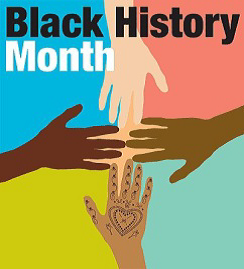 “At the Cross Roads for Freedom and Equality”
“At the Cross Roads for Freedom and Equality”
This month Bournemouth University is hosting a range of events in aid of Black History Month and are reaching out to students, staff and the public to attend. You can find out more about the events that are happening here, Black History Month 2013.
To register your attendance, please book here.
14th October, 15:00-16:30, S202 Studland House, Lansdowne Campus
Professor Elizabeth Anionwu, “Mary Seacole – Her Relevance in Today’s NHS”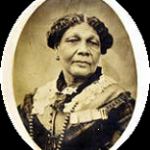
Professor Elizabeth Anionwu (CBE, FRCN) was the first ever UK sickle cell and Thalassemia nurse counsellor. Her focus on multi-ethnic aspects of nursing and midwifery education, practice and research led her to set up The Mary Seacole Centre for Nursing Practice at Thames Valley University, now the University of West London.
Elizabeth will be promoting the life of Mary Seacole, the Jamaican/Scottish Victorian doctress-nurse of the Crimean war, giving you the opportunity to learn about her life, experiences, challenges and recognition. You will also have the opportunity to discuss the relevance in which this has in today’s NHS and nursing.
17th October, 12:00-13:00, BG11, Bournemouth House, Lansdowne Campus
Dr. Farhad Dalal, “Corrupting the Liberal Ideal: Tolerance and discrimination in society and its organisations”
Dr. Farhad Dalal is a psychotherapist and Group Analyst in private practice in Devon.
Since the McPherson report, the law requires organizations to proactively address institutionalized unfair discriminatory practices, which they do through the use of ‘trainings’, proceduralisation, etc. Yet despite these efforts and the rhetoric of tolerance and inclusivity proclaimed in equal opportunity statements, women constituted just 1.6% of the conductors in BBC Proms 2010; out of 14000 professors in the UK, just 50 are Black. Why is this?
Some of the reasons why the equalities project has not progressed as much as it might have are due to the bureaucratisation of the values of Equality. This has allowed the liberal principle of ‘live and let live’ to be perverted and put in the service of fear and control.
Moreover, the Diversity discourse has been hijacked by the libertarians and put in the service of increasing profit, under the guise of inclusivity. But also, the equality movements have themselves contributed to this situation. Particularly the ‘celebrators of diversity’ who being apolitical, have sidetracked the project into promoting the indiscriminate celebration and preservation of cultures, in lieu of challenging the status quo within cultures as much as between them.
21st October, 13:00-14:00, BG14, Bournemouth House, Lansdowne Campus
Louisa Adjoa Parker, “We were here: African American Gls in Dorset”
Louisa Adjoa Parker is a British Ghanaian poet and historian who lives in Dorset. Louisa will be holding an exhibition “1944 We Were Here: African Gls in Dorset” which explores the stories of the black Gls who came to Dorset to train for D-Day. It is a collection of stories, images and craft pieces which were inspired by the research.
24th October, 10:00-12:00, BG11, Bournemouth House, Lansdowne Campus
David Michael, “A positive Voice in a Public Sector Organisation”
David Michael is a former Detective Chief Inspector. At this event David will share the challenges and barriers faced by BME people in large public sector organisations and what steps he took to overcome them to become successful and beneficial to the organisation and the BME members.
Some of David’s professional achievements include:
- Police Long Service and Good Conduct Medal (PLSGCM) from Metropolice Commissioner Sir Paul (now) Lord Condon at a ceremony at the Peel Centre, Hendon in September 1995.
- Winner of Windrush Achievements Award 2000 in the Uniformed Services Pioneer category.
- Man of Merit at the Executive and Professionals Network (EPN) Men of Merit recognition evening on 24 November 2001. In recognition of contribution to policing in London and supporting colleagues and communities.
24th October, 14:00-16:00, BG11, Bournemouth House, Lansdowne Campus
Clive Clarke, “My Journey”
Clive Clarke is deputy chief executive at Sheffield Health and Social Care NHS Foundation Trust. Clive will be telling us about the challenges he’s faced and what it took to overcome them . He will set out his vision for the future success of BME people in a Public Sector organisation as big as the NHS.
. He will set out his vision for the future success of BME people in a Public Sector organisation as big as the NHS.
1st November, 9:30-11:00, Lees Lecture Theatre, Talbot Campus
BYD.D. Armstrong, “YOU KNOW WHAT YOU ARE”
You Know What You Are… is a one-act play that explores the theme of racism in football and asks what does it mean to wear club colours.
Winston and Jeff are lifelong supporters of Stamford United, but when their team captain Jason Chapman is accused of racially abusing an opposition player, and the only black member of the team is asked to don a t-shirt saying ‘Innocent Till Proven Guilty’ their friendship is divided over club loyalty and racial responsibility.
Meanwhile… Defender Damion Dixon is the only black player or half black player at Stamford United. A rising star with an international call up on the horizon, his career and professionalism is a called into account, when he is pressured to show support for his teammate.

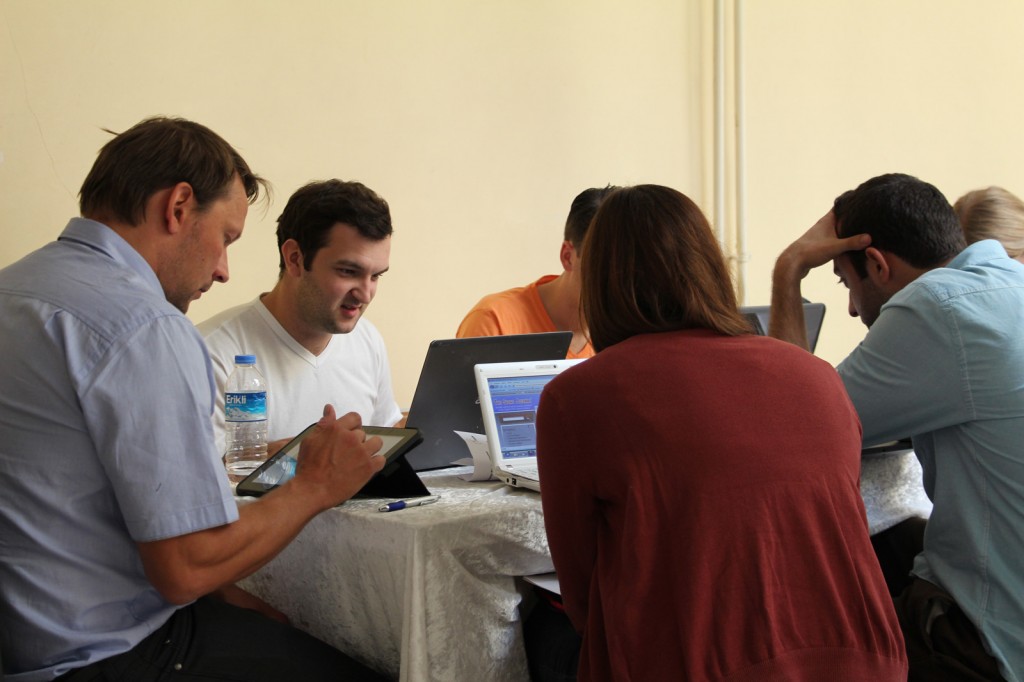
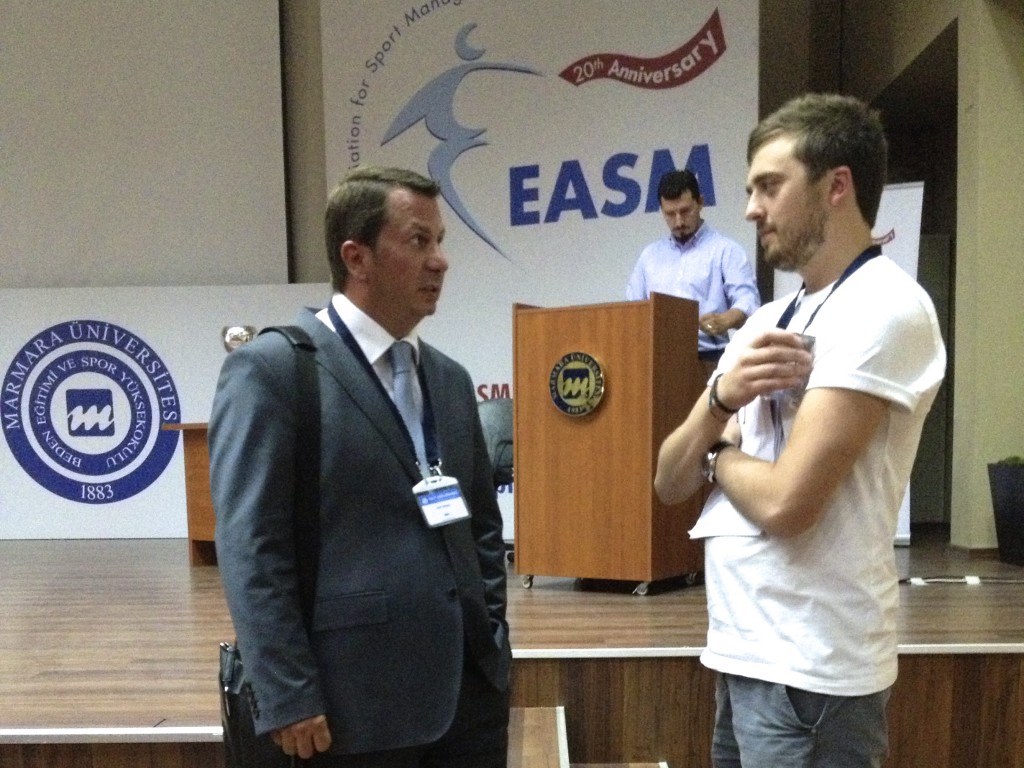
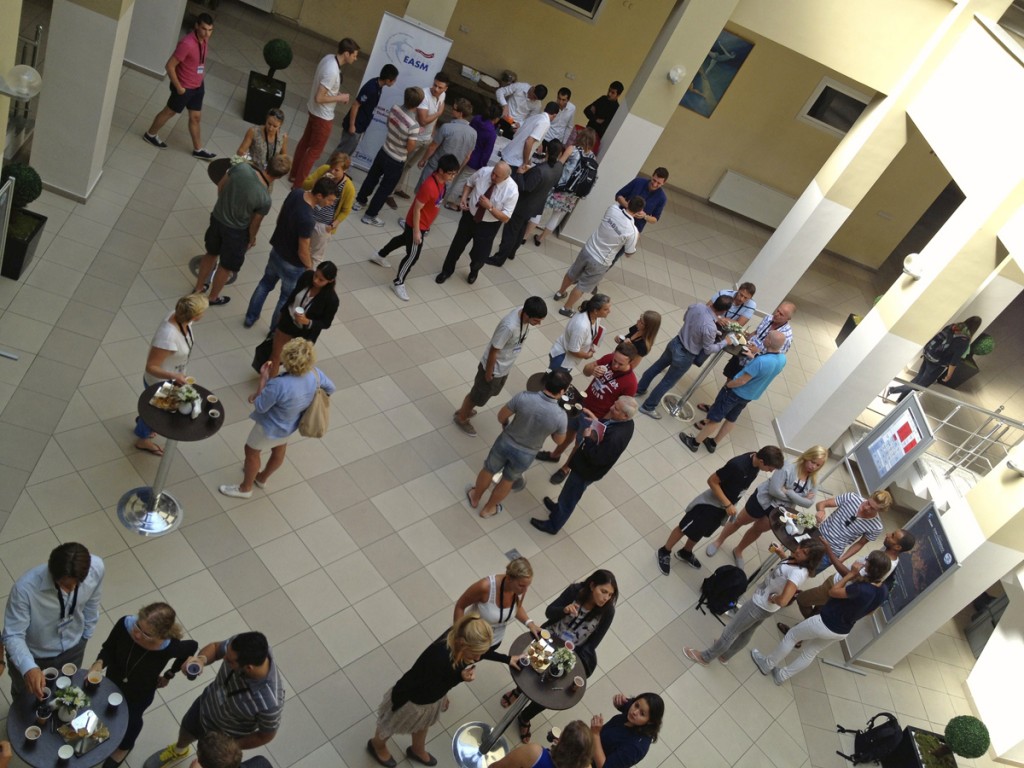
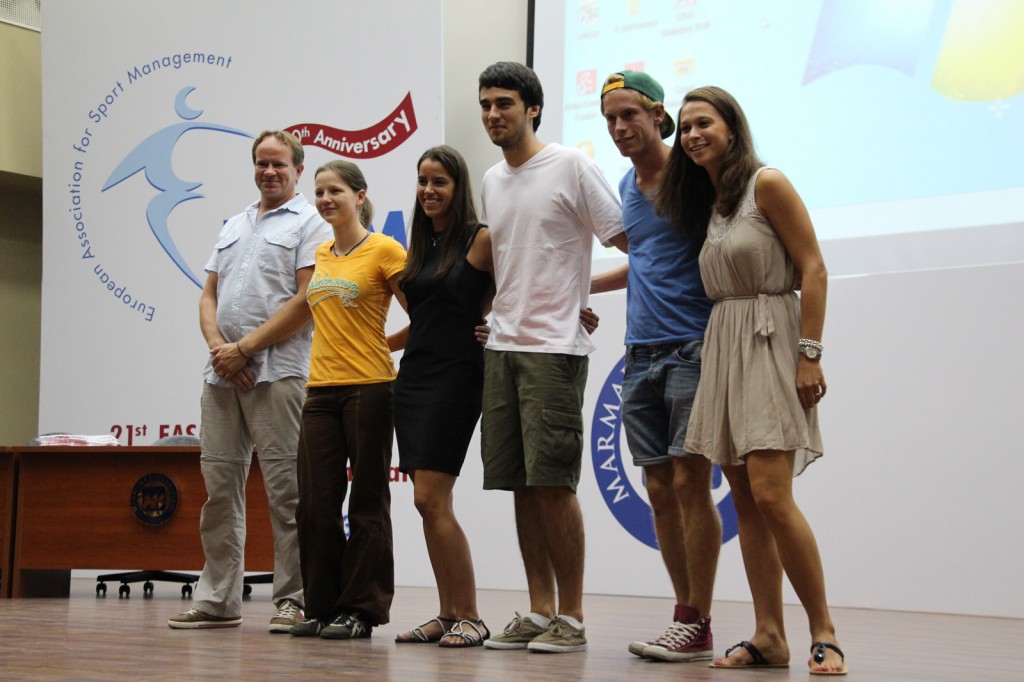
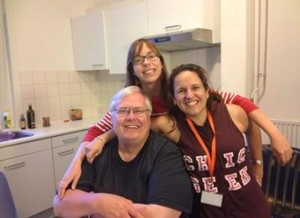











 REF Code of Practice consultation is open!
REF Code of Practice consultation is open! BU Leads AI-Driven Work Package in EU Horizon SUSHEAS Project
BU Leads AI-Driven Work Package in EU Horizon SUSHEAS Project Evidence Synthesis Centre open at Kathmandu University
Evidence Synthesis Centre open at Kathmandu University Expand Your Impact: Collaboration and Networking Workshops for Researchers
Expand Your Impact: Collaboration and Networking Workshops for Researchers Visiting Prof. Sujan Marahatta presenting at BU
Visiting Prof. Sujan Marahatta presenting at BU ECR Funding Open Call: Research Culture & Community Grant – Apply now
ECR Funding Open Call: Research Culture & Community Grant – Apply now ECR Funding Open Call: Research Culture & Community Grant – Application Deadline Friday 12 December
ECR Funding Open Call: Research Culture & Community Grant – Application Deadline Friday 12 December MSCA Postdoctoral Fellowships 2025 Call
MSCA Postdoctoral Fellowships 2025 Call ERC Advanced Grant 2025 Webinar
ERC Advanced Grant 2025 Webinar Update on UKRO services
Update on UKRO services European research project exploring use of ‘virtual twins’ to better manage metabolic associated fatty liver disease
European research project exploring use of ‘virtual twins’ to better manage metabolic associated fatty liver disease